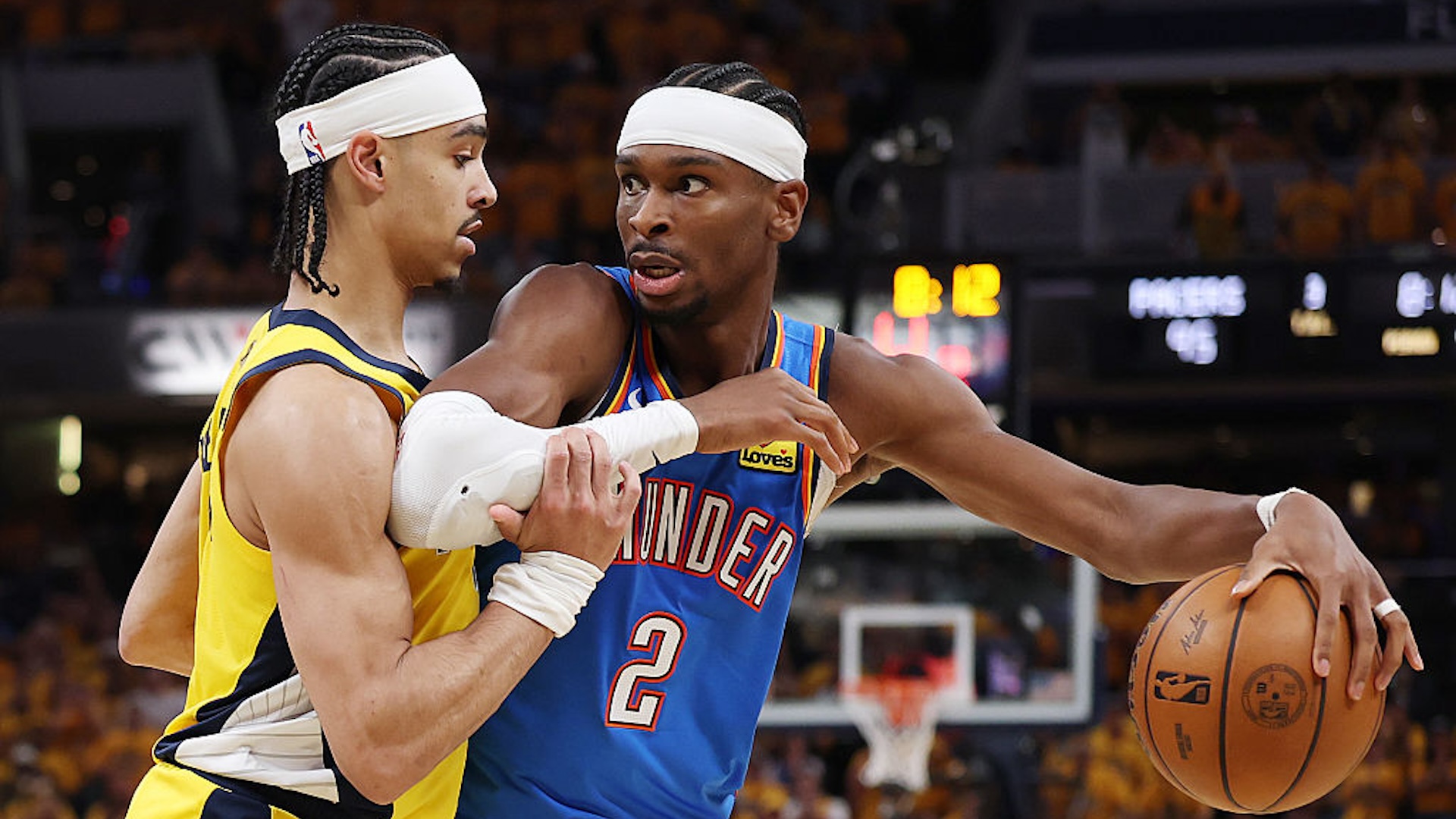The Indiana Pacers left the devil at home on Wednesday night. They didn't need him to beat the Oklahoma City Thunder, 116–107, and take a 2-1 lead in the NBA Finals.
Throughout these playoffs, the Thunder have always felt like the constant in the equation that makes up any one game. We could head into every game assured that the Thunder were A) going to apply immense pressure on the other team through physical and aggressive defensive play, and B) make plenty of room for Shai Gilgeous-Alexander to turn the screws at the other end with his shotmaking, driving, and foul-drawing. Those things always happening didn't necessarily mean that the Thunder would always win, but if they lost it was because an unexpected variable showed up somewhere else. Maybe the other team managed not to turn the ball over, or got unsustainably hot from three; maybe Mark Daigneault overthought his rotations or his late-game strategy; maybe someone hit a miracle shot at the buzzer.
The familiar equation was nowhere to be found in Game 3, in which the Pacers were just comprehensively better throughout. For the first time this postseason, it was the Thunder who were struggling to match their opponent's precision and intensity, desperately looking for a foothold as the game slipped away from them in the second half. If the teams had switched uniforms before tip-off, you would have watched this one under the impression that you were seeing yet another overbearing Thunder victory, one following all the same beats you've heard a million times before.
That reversal showed up most noticeably in the turnover column, where the Thunder coughed it up 17 times compared to the Pacers' 13. The Thunder are explicitly designed and coached to never lose the turnover battle, but Indiana was able to pull it off in this game by making Oklahoma City choke down a few spoonfuls of their own medicine. The Pacers, especially their guards, were flying around all night, jumping passing lanes and swiping at balls and creating the kind of transition opportunities that were foreclosed in the first two games of this series. T.J. McConnell was going psycho, snatching the inbounds pass multiple times and finishing with five steals in 15 minutes off the bench.
The Pacers also swarmed and menaced Gilgeous-Alexander with much more purpose than they had previously, treating the MVP to the kind of experience that the Thunder usually inflict on their opponent's best player. SGA finished with 24 points on 20 shots while he struggled to deal with the Pacers bumping and chasing him all over the floor, denying him passes, and sending double and triple teams from odd angles. SGA is so great because his game is so metronomic, but this was a rare instance in which he was struggling to find his rhythm in a game that was being played at someone else's tempo. He looked sped up and uncomfortable, never more so than on a late possession in which he walked into his sixth and final turnover:
On the other end, it was the Tyrese Haliburton and Bennedict Mathurin show. Haliburton bounced back from a meek Game 2 performance with 22-11-9, the result of an increased dosage of dribble-handoffs and more intentionally attacking the Thunder's drop coverage out of pick-and-rolls. Haliburton getting himself into more comfortable positions allowed the Pacers' offensive blender to finally whir to life, which kept them running and passing ahead of the Thunder's turnover hawks. When Haliburton is making these kind of passes—airborne, cross-court, ahead of the defense's rotation—you know things are going well:
And then there's Mathurin, who scored 27 points in 22 minutes, and not in the usual way that a bench player gets hot. This wasn't one of those cases where a backup wing hangs out in the corners and runs up a big number by hitting a bunch of threes. Mathurin spent almost every one of his 22 minutes attacking the defense as if he was the best player on the court, and he certainly looked it given the pressure he put on OKC's defenders. He took six of his 12 shots at the rim and got to the free-throw line eight times, joining Kobe Bryant, LeBron James, Tony Parker, and Kawhi Leonard on a list of guys who have scored 25 points in a Finals game at age 22 or younger.
Today is a good day to note that the Pacers were five games below .500 in December, and to remember what makes the NBA playoffs so special: the evolutionary opportunities it presents. The Pacers team that lost to Charlotte on Dec. 8 to fall to 10-15 is not the same team that stepped on the floor in Game 1 of their series against the Bucks, and that team is not the same team that beat the Thunder at their own game last night. For 82 regular-season games, the Pacers were a bang average defensive team, but that didn't prevent them from becoming a great one on Wednesday. Twenty-four hours ago, McConnell was just a Guy and Mathurin was a mercurial scorer who may or may not have been living up to his draft position. Now they are Finals heroes.
The Thunder came into this series as heavy favorites because of how fully formed and functional they are, and how obvious that made their greatness. But the Pacers might be starting to prove that they are something more dangerous: a team that's still finding out exactly what it's capable of.






